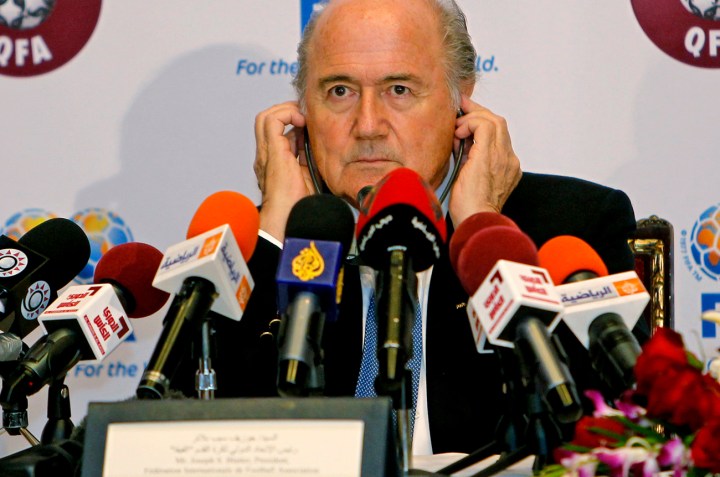Business Maverick, Multimedia, Politics, Sport
Analysis: World Cup will give SA a serotonin shot, but not much money

Surprise. Surprise. After South Africa was sold the promise of gold at the end of the Fifa rainbow, economists say it is unlikely we’ll get any sustained financial benefit from hosting the Soccer World Cup. But hey, we’ll be happier for a little while.
When South Africa and Fifa fell in love six years ago it was like a fairy tale. A Mandela moment, people were laughing, crying and way too eager to believe that the 2010 Soccer World Cup would be the “Hallelujah Happening” that’d remake the country, if not the sub-continent.
Like any bad romance, delusion has given way to the realisation that after the final whistle Fifa will trot off into the sunset with some $3.2 billion from television sponsorship rights and South Africa will get … well … what exactly will South Africa get apart from those very big and very expensive stadiums studding our landscape as a reminder of our fling with Sepp Blatter? The stadiums could be used for rallies by political leaders with egos big enough to fill them after the fact, but what other benefits can we expect from being screwed by soccer’s bad boys?
Economists Georgios Kavetsos and Stefan Szymanski say the Fifa/SA romance is pretty much going to be a “wham, bam, thank you ma’am” affair. They say we won’t be getting much more than a little after-action serotonin rush.
Photo: Watch Sepp Blatter visiting the 2010 stadiums, if you can bear it.
Residents at Cas Business School in London, Szymanski (a professor of economics) and Kavetsos (a research fellow) recently published findings in the Journal of Economic Psychology that show international sporting events do little more than enhance national well-being. For a fleeting moment.
Kavetsos and Szymanski say, “The widely proclaimed economic benefits of hosting major sporting events have received substantial criticism by academic economists and have been shown to be negligible, at best.” The pair’s paper examines the only real benefit for countries – the so-called “feel-good” factor. The research covers three global events, the Olympic Games, the Fifa World Cup and the Uefa European Championship. The results show Fifa’s big do will give us a bit of a buzz, but no lasting happiness. “We find the ‘feel-good’ factor associated with hosting football events is large and significant, but the impact of national athletic success on happiness, while correctly signed, is statistically insignificant.”
Earlier research by economists John Siegfried and Andrew Zimbalist trashed the argument that investments in sports stadiums and massive sporting events are financially lucrative. They say these investments offer comparatively low returns. “Although it is argued that investments in sports facilities boost local economic activity, reasoning and empirical evidence suggest the opposite,” they say.
Watch: FIFA vice president Jack Warner refuse to answer questions from Andrew Jennings on ticket profits.
While academic economists appear to have long known that investments in massive sporting events are risky and don’t bring significant returns (although they make us feel good) Grant Thornton insists the world cup will give this country a 0.5% economic boost.
Spin released by the audit and advisory firm’s Strategic Solutions (and revised since their first declaration on how the World Cup will benefit SA) suggests that 373,000 visitors will come to the country and translate into gross economic impact of R93 billion.
It’s no surprise to learn that Grant Thornton is retained by the ministry of environment and tourism and SA Tourism, and that the company’s research is being pumped through PR vehicles to remind South Africans how lucky we are to have leapt into bed with Fifa.
After promoting these stats SA Tourism declares: “One thing is for sure, the 2010 Fifa World Cup is going to make a major difference to the lives of many in South Africa.”
You mean the “lives” of Fifa and those life-lottery winners that made plenty on the side with sub-contracts? As for the rest of us, we may feel a little rush before the post-World Cup hang-over descends.
But not much money. And then there’s the on-going cost of maintaining those stadiums.
By Mandy de Waal
Read Owen Gibson’s blog at the UK Guardian “World Cup 2010: The coming out party that will make a mint for Fifa.” Read Chris Rodrigues “South Africa’s World Cup is a disgrace” in The Guardian. Read Times Live report on the sea of corruption that is Fifa sub-contracts. Read Grant Thornton’s “The Business of 2010″. For a laugh.
Main photo: FIFA president Sepp Blatter speaks during a press conference in Doha April 24, 2010. Blatter was in Doha for a two-day visit. REUTERS/ Mohammed Dabbous


















 Become an Insider
Become an Insider